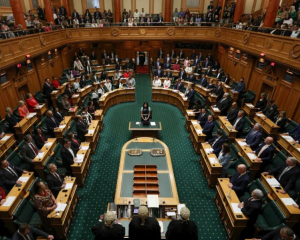The commission's recent Review of Retirement Income Policy recommended the age be raised to 67 years - by two months a year until 2033.
However, that was rejected.
"The Government has said the status quo should remain, but something needs to change to keep New Zealand Super affordable in the long term. Politicians appear to have their heads in the sand about the issue of the raising the age of eligibility," she said.
"We recommend announcing now that we will gradually raise the age of eligibility over the next 20 years. It's crucial that we make changes now, so that today's 45-year-olds and younger Kiwis are able to receive New Zealand Super in the future. Why wait until we have to raise the age suddenly in 10 years time? We can't keep ignoring this issue."
The review also recommended a transitional, means-tested benefit for people aged 65 at risk of hardship because of their inability to continue to support themselves financially over an extended period and for super rates to be adjusted each year by the average of the percentage change in consumer prices and earnings, but no less than price inflation in any year.
Ms Crossan said the review was based on thorough research, and the recommendation to raise the age of eligibility is comparable with changes made by governments in most developed countries, including the United States, United Kingdom and Australia.
The Retirement Commissioner is required to review the Government's retirement income policy every three years.
Prime Minister John Key said he was focusing on economic issues.
"We don't need to raise the age of retirement. I've given a very strong commitment to the public of New Zealand (not to do that)."
Ms Crossan said alternatives needed to be suggested if the Government was determined not to raise the age.
"What we want to do at the moment is strengthen the economy," Mr Key said.
"In the end the best way to make sure we can afford all the things we want... is to ultimately have a strong economy that produces the revenue that the Government can then deploy to make sure we can deliver the services we want. One of those is obviously pensions."
Labour leader Phil Goff said his party wasn't prepared to increase the age or reduce the payment but was critical of the Government's approach.
"The Government has stopped investing in the Cullen superannuation fund. That was $2 billion a year that was being set aside, they haven't replaced that. They've got no plan that will allow revenue to meet the cost of superannuation 10-20 years out."
Labour was not considering raising the retirement age.
"We think that we can avoid that alternative through the mechanisms that we've put in place in the past, that the Government has stopped funding, which is the Cullen Fund, and through a policy that's not a one-off sale of state assets but one that will raise tax revenue on an ongoing basis."
Mr Goff said Mr Key had "painted himself into a corner" by promising not to change the age.
"You can never say never, but what I'm saying is there are sensible things we should be doing now that would help us meet those costs."
Green Party co-leader Russel Norman agreed that the problem wasn't being addressed but his party did not have a policy to increase the age.
"The Government does have its head in the sand about it, at the very least we should have a debate around this issue."
He would welcome a cross-party panel to consider it and said a broad based consensus was needed.
"A cross-party panel would be incredibly useful but it's got to be open ended we can't walk in there with everyone saying we can't even have the discussion."
ACT's finance spokesman, Sir Roger Douglas, said the Government should take notice of Ms Crossan's advice and raise the age to 67.
"We need to radically rethink New Zealand super so that future generations do not face ever-increasing taxes to fund an unsustainable scheme," he said.
"Demographics show a decreasing number of workers to every superannuitant, from 4.5 workers today to 2.2 workers by 2036."
Sir Roger said other countries, including the US, UK and Germany, were moving to raise the retirement age but in New Zealand the Government had shut down debate.











